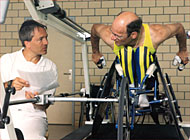Positive thinking puts patients on road to recovery

Speed is of the essence for doctors at the Swiss Paraplegic Centre in Nottwil. There's a six-hour window between pre-hospital treatment and specialised care at the centre. After six hours, damage to the nerve cells in the vertebral column is permanent.
“The helicopter is the best way to transport newly-injured patients,” said medical director, Dr Dieter Michel. “They are guaranteed medical care during the flight by a doctor who has been educated in our Centre.”
About 200 people a year in Switzerland suffer paraplegia or tetraplegia with 50 per cent of the cases resulting from traffic accidents. Accidents at the work place and sporting accidents, increasingly involving snowboarders, account for other cases.
“Sixty to 70 per cent of the patients have incomplete lesions of the vertebrae and have a good chance of making a near complete recovery,” said Michel.
Another 20 per cent of the cases is the result of illnesses such as multiple sclerosis, infectious diseases and diseases transmitted by ticks.
“It depends on the illness, but if it’s an infectious disease we can sometimes treat the infection and recovery is 100 per cent.” The average age of the new cases is 27.
It’s a year-round effort to keep the mood upbeat at the Centre. Colourful paper flowers bloom from the railings of the wheelchair ramps and cut-out floral arrangements in a larger format hang from anchors below the glass roof of the hall. Patients linger, sip drinks and chat with visitors.
The feeling of positiveness is part of the overall concept of Switzerland’s largest paraplegic centre. It is intended to help the patients cope with the pain, anxiety, frustration and doubt arising from their injury and the sweat that goes into the long hours of rehabilitation.
“Emphasising the positive is part of our concept of comprehensive care,” said Michel. Usually this involves helping paraplegics and tetraplegics help themselves by encouraging them to work towards full reintegration into family, society and job.
Almost on cue, a woman in a wheelchair passed by, giving Michel the opportunity to point out that even though she was a tetraplegic, she was working a busy, full-time schedule as a lawyer.
“This is an important perspective we have to offer our patients,” he said. “Go back to work.”
The location of the Swiss Paraplegic Centre also stresses the positive. It opened in 1990 in an idyllic pastoral landscape overlooking the Lake of Sempach, near Lucerne. It has been constructed in such a way that the windows of all the patients have a view of the lake, the fields and the nearby mountains.
“It’s important that after an accident which changes your life to have surroundings where you feel good,” said Michel.
Over the past 10 years, the private, non-profit centre has treated more than 6,000 in-patients and more than 10,000 out-patients. For paraplegics the average stay at the clinic is four to five months, while for tetraplegics it’s up to nine months. Following the completion of an expansion project in 1998, the Centre now has 140 beds.
The Swiss Paraplegic Centre is the third of three institutions founded by Dr Guido Zäch. In 1975, he set up the Swiss Paraplegic Foundation which today has more than 1.3 million patrons and in 1980, he founded the Swiss Paraplegics Association.
by Paul Sufrin

In compliance with the JTI standards
More: SWI swissinfo.ch certified by the Journalism Trust Initiative
You can find an overview of ongoing debates with our journalists here . Please join us!
If you want to start a conversation about a topic raised in this article or want to report factual errors, email us at english@swissinfo.ch.